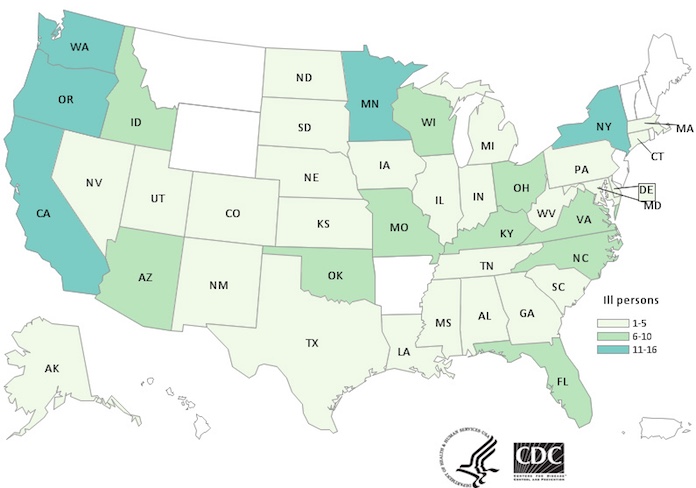The Salmonella outbreak that is linked to kratom containing products is over, according to the Centers for Disease Control and Prevention (CDC), with 199 sick in 41 states. People should be aware that kratom could be contaminated with Salmonella bacteria and contaminated products may still be available for purchase. The investigation did not identify a single, contaminated source of kratom.

Several companies did recall kratom products because they may be contaminated. The list of products is available on the FDA website.
The patient case count by state is: Alabama (1), Alaska (2), Arizona (7), California (13), Colorado (4), Connecticut (2), Delaware (1), Florida (8), Georgia (3), Iowa (2), Idaho (10), Illinois (5), Indiana (2), Kansas (2), Kentucky (6), Louisiana (3), Massachusetts (4), Maryland (3), Michigan (4), Minnesota (11), Missouri (7), Mississippi (2), Nebraska (1), North Carolina (7), North Dakota (1), Nevada (2), New Mexico (1), New York (11), Ohio (7), Oklahoma (7), Oregon (13), Pennsylvania (3), South Carolina (4), South Dakota (2), Tennessee (1), Texas (4), Utah (3), Virginia (7), Washington (16), Wisconsin (6), and West Virginia (1). Thirty-eight percent of people were hospitalized, and no deaths were reported.
This outbreak included several different types of Salmonella. They were: Salmonella I 4,[5],12:b:-, Salmonella Heidelberg, Salmonella Javiana, Salmonella Okatie, Salmonella Weltevreden, and Salmonella Thompson. Epidemiologic and laboratory evidence indicated that kratom was the likely source of this outbreak.
Investigators used the PulseNet system to identify patients who were part of this outbreak. Illness onset dates ranged from January 11, 2017 to May 8, 2018. The patient age range was from less than 1 year to 75 years.
Seventy-six percent of the people interviewed in this outback reported consuming kratom in pills, powder, or tea before they got sick. Health and regulatory officials in several states and the FDA collected various leftover and unopened products. Strains of Salmonella were found in those products.
As additional strains of Salmonella were found in these products a PulseNet search revealed ill persons infected with those strains. In all, eighty-five different DNA fingerprints of Salmonella bacteria were found in samples of kratom. The FDA website has a list of contaminated kratom products, which were sold at several retail locations and online retailers.




